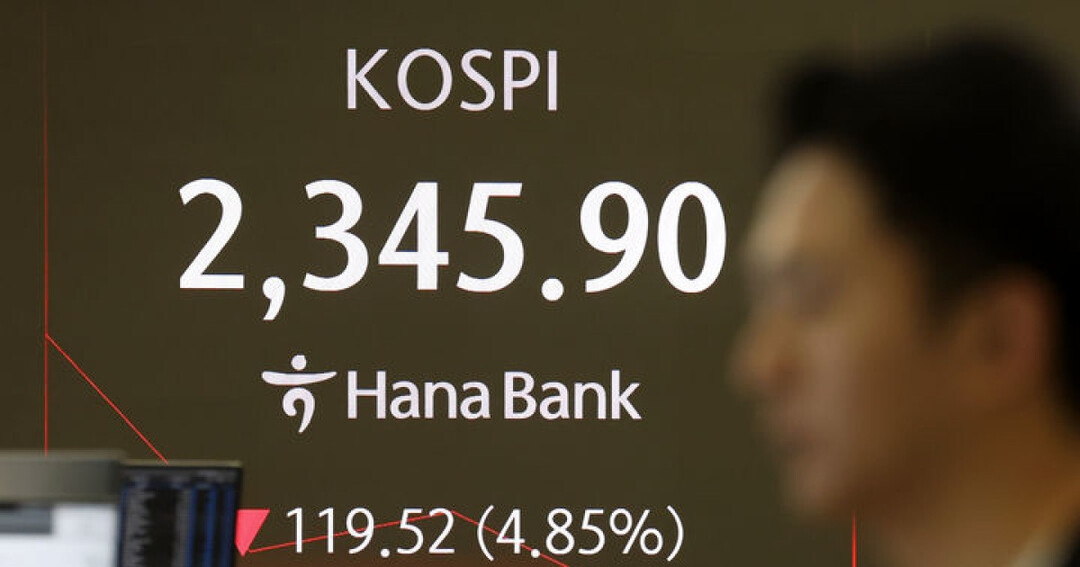
Seuol, South Korea – The South Korean benchmark KOSPI index plummeted below the critical 2300 level on Wednesday, marking its lowest close in 17 months, as the escalating trade dispute between the United States and China sent shockwaves through global financial markets. The index closed at 2293.70, a significant 1.74% (40.53 points) decline from the previous session. Intraday trading saw the KOSPI dip even further to 2284.72, briefly breaching the 2290 support. This marks the first time the KOSPI has closed below 2300 since October 30, 2023, when it finished at 2277.99.
The day began with a marginal dip, the KOSPI opening at 2329.99. Initial optimism surrounding potential trade negotiations, fueled by reports of a phone call between US President Donald Trump and South Korean Acting President Han Deok-soo, briefly buoyed the market. However, this fleeting hope was quickly overshadowed by the stark reality of newly implemented tariffs.
Effective from 1 PM KST, China now faces a cumulative reciprocal tariff of 84%, including previously announced and additional levies. Approximately 80 other nations, including South Korea which faces a 25% tariff, are also subject to these reciprocal measures. While diplomatic efforts between South Korea and Japan to mitigate the impact are reportedly underway, the unwavering tit-for-tat stance between Washington and Beijing has intensified risk aversion among investors.
Foreign investors were particularly active in offloading Korean equities, net selling approximately 1 trillion won ($672 million USD) in spot market trades and 600 billion won in futures contracts on the main bourse. This selling spree extends their net selling streak in both segments to nine consecutive trading days, significantly contributing to the day's sharp decline.
The tech-heavy KOSDAQ index also suffered a substantial loss, closing at 643.39, down 2.29% (15.06 points). This is the first time the junior market has fallen below the 650 threshold in four months, since December of last year.
The contagion of trade war anxieties spread across Asian markets, erasing the gains witnessed in the previous session. Japan's Nikkei 225 index, which had experienced a 6% rebound on Tuesday, sharply reversed course, falling by 3.93%. Taiwan's Taiex index experienced a dramatic 5.79% plunge, culminating in an 18% market capitalization loss over the past three trading days. Bucking the regional trend, Chinese stock markets, including the Shanghai Composite, managed to close in positive territory, largely attributed to domestic market stabilization measures implemented by Beijing.
Adding to the downward pressure on the Korean market were the surging US long-term Treasury yields and a rapidly appreciating US dollar against the Korean won. The yield on the benchmark US 10-year Treasury note climbed to 4.5% in Asian trading hours, while the won-dollar exchange rate peaked at 1487 won per dollar. Analysts note that rising US Treasury yields and a stronger dollar typically trigger outflows of foreign investment from emerging markets like South Korea. The sharp increase in US long-term yields is particularly concerning as it can signal a rush to sell US government bonds, potentially foreshadowing a broader liquidity crunch.
Market analysts are increasingly concerned that the protracted trade conflict and the imposition of tariffs could ultimately trigger a global economic recession, which would further exacerbate the downturn in equity markets and negatively impact corporate earnings. Lee Woong-chan, a researcher at iM Securities, cautioned, "If an economic recession takes hold, we could see further declines in stock markets and corporate profitability. While the KOSPI's downside might be limited given the possibility of future tariff negotiations, there are currently no strong catalysts for a significant rebound." The coming weeks will be crucial in assessing the trajectory of the US-China trade relations and their continued impact on the South Korean economy and its financial markets.
[Copyright (c) Global Economic Times. All Rights Reserved.]




























